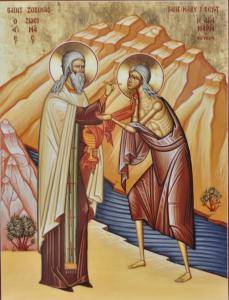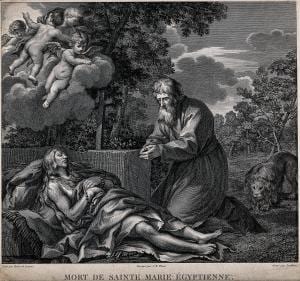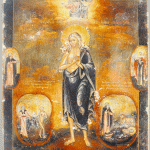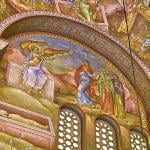
Following the Sunday of St. John Climacus, the fifth Sunday of the Great Fast is the Sunday of St. Mary of Egypt. Usually elements of the life St. Mary of Egypt, a reformed prostitute who lived alone in the desert for many years, are used to show us of the hope we can have of God’s grace. No matter what sins we have done, God’s love can save us. We can change. We can become holy men and women of God. Miracles can happen in our lives. God doesn’t cast us aside for what we have done. We were the ones who turned away.
This is an important message and one which cannot and should not be ignored. However, perhaps for us today, the other part of her story, the time which she lived alone in the desert, apparently for decades before meeting the priest Zosimas, is relevant. She was alone for years, unable to receive the eucharist; indeed, she did not have any human contact until nearly the end of her life. By the grace of God, she survived and found herself transformed into an extraordinarily holy woman. Thus, the Golden Legend relates of her:
Mary the Egyptian, who is called the Sinner, led a most austere life in the desert for forty-seven years, beginning about the year of the Lord 270 in the time of Claudius. A priest named Zozimus crossed the Jordan and began to wander through the broad forest, hoping to find some holy father there, and saw a figure walking about naked, the body blackened and burned by the fiery sun. It was Mary the Egyptian.[1]
While it is nearly impossible for us to know how long she was in the wilderness, fending for herself and relying upon God’s grace to survive, she shows us that we, too, can rely upon God’s grace in our lives even when we find ourselves in isolation and without access to the eucharist. No matter where we are at, God’s grace continues to be offered to us. If we have to engage social distancing for one reason or another, and find ourselves without the company of others, and without ordinary access to the sacraments, God does not abandon us. His merciful grace will be offered to us, perhaps in extraordinary forms, and all we need to do is accept it. No matter where we are, even on a deserted island, we can walk with God and find ourselves transformed into holy men and women thanks to his presence in our lives.
According to her biography, Mary, as a teen, had no one to take care of her. Prostitution turned out to be the only thing she could figure out doing to make enough money to survive. Though she was not rich, she enjoyed her work so much, she often did not charge her customers. Once, she went with a group of pilgrims to Jerusalem. Apparently, she did not lack patrons on that journey. Once they arrived in Jerusalem, for the Feast of the Exaltation of the Cross, she tried to go to the church in which the Cross was contained (the Holy Sepulchre), but found herself stopping outside the door. It was as if a force forbade her entry. Standing outside, looking in, seeing the crowds venerating the Cross, she began to feel sorrow for what she had done in her life. Looking up, she saw an icon of the Theotokos above the door. She wept for her sins and promised the Theotokos (and God) that she would become an ascetic. Through her sorrow, she felt free to enter the church, venerate the Cross, give her confession and receive communion. It would be the last communion she would have until she met the monk-priest Zosimas.

She went out into the desert, and lived alone; after several years, the clothes she wore had worn out. When at last Zosimas discovered her living in the desert, he gave his mantle to her so she could be covered as they talked and she told him her story. She asked for him to come back the next year, on Holy Thursday, to give her communion, which he did. She once again asked him to come back a year later, and when he did so, he found her body and a note beside it which indicated she had died soon after she had received communion from him. He was asked to make sure her body was buried, which he did (according to legend, with the help of a lion).
What a remarkable woman Mary was. She who was forced into prostitution, learned to live a life of libertine excess, only to realize the folly of her ways as her conscience stopped her from becoming a total hypocrite and entering the church (unlike many of her companions in the pilgrimage). She suddenly realized she was made for something better, something greater, and she could have it. But to have it, she would require social distancing; she would have to put an extraordinary distance between her and everyone else. She lived alone. She isolated herself. She did not receive sacramental communion for years, indeed, for decades, and yet her spiritual life thrived. God took care of her, and she became truly free, free from all worldly cares.
We do not know what God has in store for us. We must always take things as they come. While practicing social distancing and not going to church, we are not distancing ourselves from God. Indeed, God is always there, closer to us than our own hearts.
Distancing ourselves to protect each other from one contagion or another only brings us closer to God, because we are acting out of love and concern for each other. We are imitating Jesus, who in his love for us, emptied himself of his heavenly glory to become man. He distanced himself from the Father out of his love for the Father, and also out of his love for us. Thus, when it is necessary, when we distance ourselves from each other, thinking and acting on behalf of the each other for our reciprocal needs, we are imitating in our lives the kenosis of the God-man.
Mary, in giving herself over to God, distanced herself from everyone else. By doing so, she was able to find God and with God, to find her true self and her true worth. Not all are called to such a radical form of social distancing, and yet it shows, even in such an extreme form of social distancing, God’s graces continue to be offered. Mary, in her walk with God, found peace and happiness. She truly became a remarkable woman who transcended the various men who she had met in her life. Indeed, even the priest Zosimas found she put to shame his own way of life, and so by coming into contact with her, he learned what he had failed to learn in his own religious community.
Indeed, through Mary, and her apparently low way of life, we learn the way of true glory is not to be found with the pursuit of earthly honors. It is rather out of self-giving love which does not seek or hold onto any glory for ourselves. This is what Jesus wanted his apostles to learn after James and John asked for specific honors for themselves:
And James and John, the sons of Zebedee, came forward to him, and said to him, “Teacher, we want you to do for us whatever we ask of you.” And he said to them, “What do you want me to do for you?” And they said to him, “Grant us to sit, one at your right hand and one at your left, in your glory.” But Jesus said to them, “You do not know what you are asking. Are you able to drink the cup that I drink, or to be baptized with the baptism with which I am baptized?” And they said to him, “We are able.” And Jesus said to them, “The cup that I drink you will drink; and with the baptism with which I am baptized, you will be baptized; but to sit at my right hand or at my left is not mine to grant, but it is for those for whom it has been prepared.” And when the ten heard it, they began to be indignant at James and John. And Jesus called them to him and said to them, “You know that those who are supposed to rule over the Gentiles lord it over them, and their great men exercise authority over them. But it shall not be so among you; but whoever would be great among you must be your servant, and whoever would be first among you must be slave of all. For the Son of man also came not to be served but to serve, and to give his life as a ransom for many” (Mk. 10:35 – 45 RSV).
Whoever wants to be great in the kingdom of God must learn to be the servant of all. They must learn to empty themselves of all vainglory. They must truly follow after Christ who, in his love for humanity, did not hold his own eternal glory as a barrier to the incarnation. James and John wanted earthly glory, and the other apostles, upon hearing what they did, grumbled and were annoyed, because they too were seeking a similar glory but had yet to ask Jesus for it. Jesus’ answer was to show the path to true glory was found in humility:
The humble and meek Master neither convicts the two who made a request that sprang from immoderate ambition nor rebukes the remaining ten for their indignation and jealousy. Instead, he offers an example to teach them that the greatest is the one who becomes least, and he who is the slave of all is the one who becomes lord. In vain, therefore, had the two brothers sought things that were beyond their measure, and in vain do the others grieve over their desire to be greatest. For one comes to the summit of virtue by the power of humility. [2]
Or, as St John Chrysostom explains:
What he is saying is that, if you wish the privilege of the first place and the highest honor, seek the place which is last, seek to be less worthy, more humble, less important than all, and to tank yourselves below the others. This is the virtue which gives this honor. [3]
Mary engaged social distancing out of humility. She did not ask Jesus to make her great so as to receive a great position in his kingdom; rather, she accepted what her conscience directed her to do, to go out into the desert and live alone with God. She did not ask God to find her a way to give her frequent reception of the eucharist. Rather, she was given spiritual communion with God, finding that such grace was sufficient. She did not grumble. She did think of the gifts of God as rights which she could demand others satisfy for her. When we, likewise, find ourselves separated from church activities, when we find ourselves without ordinary access to priests and the sacraments, we should look to her and her humility and accept the small trials we have. We should reach out to God in prayer, and receive from him the blessings he is willing to give – and not try to bind him, like James and John, with our desires. We must even learn to forgo all external forms of piety which we use to make ourselves look great and accept, rather, the circumstances we find ourselves in; then in our humility, we can find our walk with God continues, and indeed, grows stronger. This is how we make sure that if and when the time comes, we will once again receive the eucharist, we truly will be ready. Let us hope we will be able to partake of it with the loving respect and gratitude St Mary must have had when she received it from Zosimas.
[1] Bl. Jacobus de Voragine, The Golden Legend: Volume I. trans. William Granger Ryan (Princeton: Princeton University Press, 1993), 227.
[2] St Jerome, Commentary on Matthew. Trans. Thomas P. Scheck (Washington, DC: CUA Press, 2008), 228.
[3] St. John Chrysostom, On the Incomprehensible Nature of God. Trans. Paul W. Harkins (Washington, DC: CUA Press, 1982), 230 [Homily VIII].
Stay in touch! Like A Little Bit of Nothing on Facebook.
If you liked what you read, please consider sharing it with your friends and family!
















